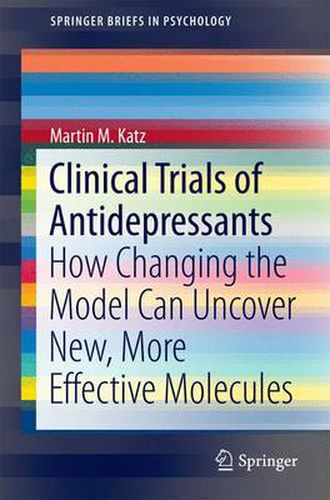Readings Newsletter
Become a Readings Member to make your shopping experience even easier.
Sign in or sign up for free!
You’re not far away from qualifying for FREE standard shipping within Australia
You’ve qualified for FREE standard shipping within Australia
The cart is loading…






This title is printed to order. This book may have been self-published. If so, we cannot guarantee the quality of the content. In the main most books will have gone through the editing process however some may not. We therefore suggest that you be aware of this before ordering this book. If in doubt check either the author or publisher’s details as we are unable to accept any returns unless they are faulty. Please contact us if you have any questions.
This brief guide takes current clinical trial protocols to task and replaces them with a contemporary framework for improving next-generation antidepressants and their underlying science. Innovative models are based on a nuanced, neurologically-informed understanding of drug mechanisms and the component cognitive, mood, and behavioral aspects of depression. The book reconceptualizes not only the clinical trial process but the clinical concept of depression itself as essential to bringing pharmaceutical research and development up to date, boosting efficiency and effectiveness, finding new molecules, and reducing waste. Case studies and a review of salient depression scales illustrate the potential benefits of such wide-scale change.
Included in the coverage:
Why
now the need for a new clinical trials model for antidepressants?
Aims
and basic requirements of clinical trials: conventional and
component-specific models. Methods
for measuring the components and the profile of drug actions: the
multivantaged approach. Achieving
the ideal clinical trial: an example of the merged componential and
established models. Prediction
and shortening the clinical trial. The
video clinical trial.
Clinical Trials of Antidepressants will interest a varied audience, including clinical investigators, academic and pharmaceutical company scientists, clinical trial organizations, psychiatrists, outpatient physicians, psychotherapists, clinical psychologists, psychology graduate students, medical students, and government agencies such as the FDA.
$9.00 standard shipping within Australia
FREE standard shipping within Australia for orders over $100.00
Express & International shipping calculated at checkout
This title is printed to order. This book may have been self-published. If so, we cannot guarantee the quality of the content. In the main most books will have gone through the editing process however some may not. We therefore suggest that you be aware of this before ordering this book. If in doubt check either the author or publisher’s details as we are unable to accept any returns unless they are faulty. Please contact us if you have any questions.
This brief guide takes current clinical trial protocols to task and replaces them with a contemporary framework for improving next-generation antidepressants and their underlying science. Innovative models are based on a nuanced, neurologically-informed understanding of drug mechanisms and the component cognitive, mood, and behavioral aspects of depression. The book reconceptualizes not only the clinical trial process but the clinical concept of depression itself as essential to bringing pharmaceutical research and development up to date, boosting efficiency and effectiveness, finding new molecules, and reducing waste. Case studies and a review of salient depression scales illustrate the potential benefits of such wide-scale change.
Included in the coverage:
Why
now the need for a new clinical trials model for antidepressants?
Aims
and basic requirements of clinical trials: conventional and
component-specific models. Methods
for measuring the components and the profile of drug actions: the
multivantaged approach. Achieving
the ideal clinical trial: an example of the merged componential and
established models. Prediction
and shortening the clinical trial. The
video clinical trial.
Clinical Trials of Antidepressants will interest a varied audience, including clinical investigators, academic and pharmaceutical company scientists, clinical trial organizations, psychiatrists, outpatient physicians, psychotherapists, clinical psychologists, psychology graduate students, medical students, and government agencies such as the FDA.